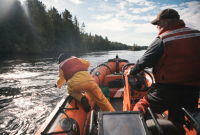The federal ethics watchdog is examining the actions of Fisheries Minister Dominic LeBlanc over the granting of a controversial clam fishing licence.
The office of conflict of interest and ethics commissioner Mario Dion said Friday that confidentiality requirements limit it to revealing that a probe into LeBlanc's conduct in relation to an unspecified licence began May 11.
However, The Canadian Press has independently confirmed the investigation concerns a multimillion-dollar licence to fish Arctic surf clam in waters off Newfoundland and Labrador and Nova Scotia.
Conservative MP Todd Doherty has been pressing the Liberal government for weeks about how Five Nations Clam Co., won the licence.
The deal, which ended a monopoly on the Arctic clam fishery held by Clearwater Seafoods since 1999, was supposed to offer 25 per cent of the catch to local Indigenous communities as a way of promoting reconciliation and economic growth.
The company, it turns out, has ties to the Liberal party and several sitting Liberal MPs, including LeBlanc himself.
Court documents also suggest it may not have met some key eligibility requirements in the government's tender process when the deal was announced.
The minister should never have been involved in the deal, insists Doherty, who asked the ethics commissioner to investigate.
Doherty fears the possible ramifications of the deal, as well as the message he believes it sends about how the Liberal government is managing a vital East Coast industry.
"I think Canadians deserve for us to be questioning and fighting for answers," said the B.C. MP, who plans to resume his broadsides against the Liberals when the House resumes on Tuesday.
"Up until recently there was consistent rules and regulations and now it just appears that if you've got some ... connections within the party and within the cabinet, those rules aren't going to be applied, and that's what we're seeing with this."
The government issued an expression of interest, calling for proposals from Indigenous organizations in Quebec or one of the four Atlantic provinces, properly licensed and majority-owned by Canadians.
Proposals representing multiple Indigenous communities would be given priority, the tender indicated.
On Feb. 21, LeBlanc announced the deal had been awarded to Five Nations, describing the company as "comprised of First Nations from Quebec, Nova Scotia, Newfoundland and Labrador, Prince Edward Island and New Brunswick."
In fact, at the time, the company only had two Indigenous partners: the Elsipogtog First Nation in New Brunswick and the Nutashkuan Innu in Quebec.
The Miawpukek Band in Newfoundland, which had submitted its own proposal, has launched a court challenge alleging LeBlanc breached his duty of fairness in awarding the licence to Five Nations.
Court documents show LeBlanc not only knew Five Nations did not have confirmed partners in P.E.I., Nova Scotia or Newfoundland, but also indicate that even as he was approving their bid, he was urging the company to quickly rectify the problem.
"Please take next steps with proponent #6 (Five Nations) and ensure that additional Indigenous communities are quickly confirmed," LeBlanc wrote in a handwritten scrawl on the final approval document.
In its proposal, Five Nations was forthright in admitting it did not yet have partners from the three other Atlantic provinces and was not yet incorporated. Indeed, the company was not officially registered in Nova Scotia until Dec. 13, 2017, records show — well past the Nov. 22 proposal deadline to submit proposals. The company was not registered in New Brunswick until Feb. 28 of this year.
Five Nations is partnered with Premium Seafoods, a non-Indigenous Nova Scotia company whose president is Edgar Samson — the brother of Liberal MP Darrell Samson. A recently added Indigenous partner, NunatuKavut, is headed by former Liberal MP Todd Russell.
Doherty has also drawn ties between the deal and LeBlanc himself: The Five Nations proposal said it would be headed up by Gilles Theriault, who is cousin to the minister's wife.
"We believe that there are some serious enough questions that Canadians on all sides of the country should be worried about this," Doherty said.
"I'm not saying which proposal was the strongest, but I don't think Five Nations was the strongest by any stretch — and to be awarded this contract just from a stroke of a pen from just who you know and, perhaps, who you're related to, is pretty shocking."
LeBlanc's office would not make him available for an interview, but the minister has repeatedly defended the decision to award the licence to Five Nations as part of the government's efforts to develop a renewed relationship between Canada and Indigenous Peoples.
"The minister made his decision to allow for increased Indigenous participation in the fishery and we reject any insinuation to the contrary," said LeBlanc spokesman Vincent Hughes.
Big players in the fishing industry are also upset over the deal.
The Fisheries Council of Canada, which represents 100 fishing companies across the country, accused the government of unilaterally taking 25 per cent of the Arctic clam quota away from Clearwater without consultation or due process.
That decision has created a sense of instability in the fisheries sector, council president Paul Lansbergen told a news conference in Ottawa.
"Taking away long-standing licences and quotas does not respect past investments and has eroded the sector's confidence to invest and could undermine conservation efforts," Lansbergen said.
Clearwater, meanwhile, was doing all it could behind the scenes to hold on to its monopoly.
Court documents show the company secretly offered to give up two of its four licences to an Indigenous group, but only if it could maintain control over the harvesting, processing and marketing of any seafood caught under those licences.
"If the policy objective is to diversify ownership, we are committed to finding constructive solutions," Clearwater said in a letter to LeBlanc in May 2017.
"If it is to satisfy those who seek to grow their interests at our expense, then we have a problem."





Comments